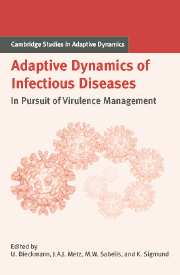Book contents
- Frontmatter
- Contents
- Contributing Authors
- List of Boxes
- Notational Standards
- 1 Introduction
- A Setting the Stage
- B Host Population Structure
- C Within-Host Interactions
- Introduction to Part C
- 9 Super- and Coinfection: The Two Extremes
- 10 Super- and Coinfection: Filling the Range
- 11 Multiple Infection and Its Consequences for Virulence Management
- 12 Kin-selection Models as Evolutionary Explanations of Malaria
- D Pathogen–Host Coevolution
- E Multilevel Selection
- F Vaccines and Drugs
- G Perspectives for Virulence Management
- References
- Index
- International Institute for Applied Systems Analysis
10 - Super- and Coinfection: Filling the Range
Published online by Cambridge University Press: 15 January 2010
- Frontmatter
- Contents
- Contributing Authors
- List of Boxes
- Notational Standards
- 1 Introduction
- A Setting the Stage
- B Host Population Structure
- C Within-Host Interactions
- Introduction to Part C
- 9 Super- and Coinfection: The Two Extremes
- 10 Super- and Coinfection: Filling the Range
- 11 Multiple Infection and Its Consequences for Virulence Management
- 12 Kin-selection Models as Evolutionary Explanations of Malaria
- D Pathogen–Host Coevolution
- E Multilevel Selection
- F Vaccines and Drugs
- G Perspectives for Virulence Management
- References
- Index
- International Institute for Applied Systems Analysis
Summary
Introduction
How many different strains of a disease can coexist in a single population of hosts? What effect do different mechanisms of coexistence have on the properties of diseases? The principle of competitive exclusion (Armstrong and McGehee 1980; Levin 1970) states that no more species can coexist in a system than the number of resources or limiting factors allow, which can be thought of, somewhat imprecisely, as stating that a single trade-off can support only a single species – the one that deals best with that trade-off. Disease models describe a simple ecological interaction, with hosts acting as resources, to test the limits of competitive exclusion. Trade-offs for the disease often involve virulence, a trait of abiding interest to hosts.
In the absence of a trade-off between host mortality and transmission efficiency, the disease strain with the lowest virulence would always win out in competition, and diseases would be favored to evolve ever-reduced virulence. When such a trade-off between host mortality and transmission efficiency exists, the single strain that maximizes the basic reproduction ratio R0 will persist (see Boxes 2.2, 5.1, and 9.1; Bremermann and Thieme 1989). Ecological factors that affect this trade-off, such as host density, might favor higher or lower virulence (Ewald 1994a). However, in the absence of spatial or temporal variation in these factors, only one strain persists [but see Andreasen and Pugliese (1995) for a case in which coexistence is due to density-dependence in the host].
- Type
- Chapter
- Information
- Adaptive Dynamics of Infectious DiseasesIn Pursuit of Virulence Management, pp. 138 - 149Publisher: Cambridge University PressPrint publication year: 2002
- 9
- Cited by

